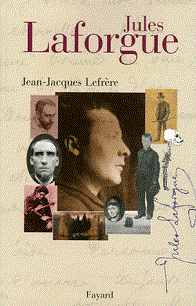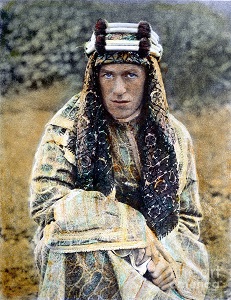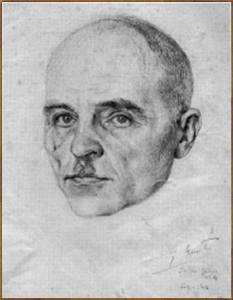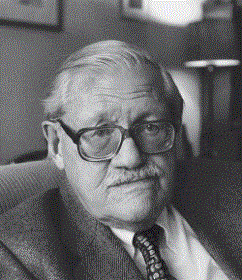|
De Franse dichter Jules Laforgue werd geboren in Montevideo op 16 augustus 1860. Zie ook alle tags voor Jules Laforgue op dit blog en ook mijn blog van 16 augustus 2010.
Sundays
Autumn! It is autumn! Once again autumn!
The great gale and all its trail
Of reprisals, and of music . . .
It is “Closed for the Season” at seaside hotels.
Leaf-fall, fall of Antigones and Philomels:
My gravedigger, Alas poor Yorick!
Lumps them pell-mell.
Love and straw-fires for ever!
The good young ladies
Inviolable and frail
File soberly this way
Summoned by the chapel-bell
Hygienically and most dulcetly
As befits the “sweet” Sabbath-day.
How all around them grows purified
And Sundayfied.
And how faces all grow long at the sight of them!
As for me, though: I am the Great White Bear,
Brought hither by iceberg ferry,
More polar, more spotless pure
Than those girls in white millinery;
Not, though, what you would call a churchgoer.
I am the Grand Master of Analysis;
Remember this.
And yet . . . and yet . . . why so pale?
Come, trust your old friend, you can tell me the tale.
Ah no? Can such things be?
I turn my face to the seas and the rough skies,
To all things that grumble and that utter sighs.
Such things! Such things!
Matter for sleepless nights and nail-bitings.
Poor, poor, for all their promisings!
And we! Drowned in such seas,
Plunged into such wonderment,
Fallen to our knees . . . !
O wonder, found and at once hidden,
So martyred, poor, yet full of passion,
Being, as it were, a thing forbidden
Never to be touched, save in dream fashion.
Wondrous thing,
Most violet attar, precious residue,
The universe
Has care of you
And planets in their courses are your nurse
From burying to marrying.
Oh, it is rich not to be bought!
Just your dear eyes, there, in the skies –
Greater than God, higher than thought,
Those thoughtless and thought-coloured eyes!
So frail, so thin!
And all that mortal warmth
Hoarded within!
O forgive her, if, unthinking
(How well it becomes her!)
She makes eyes a little
To beg you a little
To have pity a little!
O frail, frail, and still athirst
For those Masses which I so mock!
Bend, bend your dear head; O look,
The spring-time, the lilac-burst.
I was not thinking, I swear, of lovemakings
But of heavenly things!
O if, after morning Mass,
We could but vanish and be no more
– Being sick of the human race,
So well-contented, so crass,
There, at the church-door
Vertaald door P. N. Furbank

Jules Laforgue (16 augustus 1860 - 20 augustus 1887)
Cover
De Britse prozaschrijver, archeoloog en militair Thomas Edward Lawrence werd geboren op 16 augustus 1888. Hij staat beter bekend als Lawrence of Arabia. Zie ook alle tags voor T. E. Lawrence op dit blog en ook mijn blog van 16 augustus 2010.
Uit:Seven Pillars of Wisdom
“We rode on across the great valley. A camel-rider, garrulous and old, came out from the houses and jogged over to join us. He named himself Khallaf, too friendly-like. His salutation came after a pause in a trite stream of chat; and when it was returned he tried to force us
into conversation. However, Tafas grudged his company, and gave him short answers. Khallaf persisted, and finally, to improve his footing, bent down and burrowed in his saddle pouch till he found a small covered pot of enamelled iron, containing a liberal portion of the staple of travel in the Hejaz. This was the unleavened dough cake of yesterday, but crumbled between the fingers while still warm, and moistened with liquid butter till its particles would fall apart only reluctantly. It was then sweetened for eating with ground sugar, and scooped up like damp sawdust in pressed pellets with the fingers.
I ate a little, on this my first attempt, while Tafas and Abdulla played at it vigorously; so for his bounty Khallaf went half-hungry: deservedly, for it was thought effeminate by the Arabs to carry a provision of food for a little journey of one hundred miles. We were now fellows, and the chat began again while Khallaf told us about the last fighting, and a reverse Feisal had had the day before. It seemed he had been beaten out of Kheif in the head of Wadi Safra, and was now at Hamra, only a little way in front of us; or at least Khallaf thought he was there: we might learn for sure in Wasta, the next village on our road. The fighting had not been severe; but the few casualties were all among the tribesmen of Tafas and Khallaf; and the names and hurts of
each were told in order.
Meanwhile I looked about, interested to find myself in a new country.
The sand and detritus of last night and of Bir el Sheikh had vanished.”

T. E. Lawrence (16 augustus 1888 – 19 mei 1935)
De Nederlandse journalist, letterkundige, criticus en publicist Pierre Henri Ritter jr. werd geboren in Utrecht op 16 augustus 1882. Zie ook alle tags voor Pierre Henri Ritter jr. op dit blog en ook mijn blog van 16 augustus 2010.
Uit: Het nieuwe boek van J. van Oudshoorn (“Zondag”)
“Belangwekkender dan de bibliotheek van lijvige romans en novellenbundels die een over-milde literaire Sint ons dit jaar bracht, zijn drie kleine boekjes: de ‘Marginalia’ van Dirk Coster, ‘Pandorra’ van Arthur van Schendel, en ‘Zondag’ van J. van Oudshoorn. Het is merkwaardig, dat onze literatuur, die zich zoo te buiten gaat aan schrijf-onmatigheid, tegelijkerstijd in enkele bladzijden in staat is, haar ware beteekenis te handhaven van vertolking van geestelijk leven. De meeste romans behandelen de problemen der salons, zeldzamer ontdekt men achter woorden en verbeeldingen zielkundige of wijsgeerige vraagstukken, vraagstukken die de kern van het leven betreffen.
Het vraagstuk dat de pen van J. van Oudshoorn bestuurt, is, bij voortduring, het vraagstuk van de eenzaamheid der ziel. Individualisme, zegt men, en men spreekt daarmede onbewust uit, dat hier het probleem aan de orde is van onze wezenseigenheid, die zich on-verdeeld gevoelt, die zich één gevoelt met het Al-leven, het Al-leven dat zich in hoogste instantie aan den mensch openbaart als de Negatie, als het Niet. Een geest als die van van Oudshoorn, die zich immer aan den afgrond van dat Niet bevindt, zonder nochthans in dat Niet ten onder te gaan, komt voor de noodzakelijkheid, te moeten leven, zijn persoonlijkheid te moeten vinden. Dit is een noodzakelijkheid die de gewone, gezond-levende mensch niet beseft. Die laat zich voortdrijven door het instinct van zijn vitaliteit, hij verricht de daden van het leven altijd onbewust, en die onbewustheid stelt hem in staat, voortdurend aan zijn ijl en oneindig, zijn vaag en twijfelend innerlijk de beperking op te leggen van de positieve persoonlijkheid. Een menschenziel is als een waterdroppel, waarin zich de duizend nuancen van werelden en hemelen weerspiegelen, zij is aarzelend door haar rijkdom en helderheid, en: iets positief-willen eischt immer de hardhandige verbreking van mogelijkheden.
Daarom hebben de beste geesten altijd de grootste moeite tot omlijnde overtuigingen te komen, omlijnde overtuigingen, die de menschengemeenschap, als het ware om haar bestaan te verzekeren, onverbiddelijk eischt.”

Pierre Henri Ritter jr. (16 augustus 1882 – 13 april 1962)
Portret door Gerardus Knuttel, 1942
De Nederlandse dichter, journalist en vertaler Max Schuchart werd geboren in Rotterdam op 16 augustus 1920. Zie ook alle tags voor Max Schuchart op dit blog en ook mijn blog van 16 augustus 2010.
s.o.s.
Eén onbedachtzaam moment,
En wat in den tijd werd volbracht-
Van den jagenden holenmensch
En den eersten vuursteenslag
Tot Franklin D. Roosevelt-
Zal, in een hooploozen strijd
Om den zin van een verder bestaan,
In den afgrond der eeuwigheid
Spoorloos ten ondergaan.
Dualisme
Ik zou wel graag zo willen zingen,
Als Leopold of Engelman,
Van ijle, porseleinen dingen
En liefde op een hoger plan.
Maar, nachtegaal, mijn stem is stuk
En met mijn hart voorgoed gebroken;
Ik stamel schor om wat geluk
En om een vrouw die goed kan koken.

Max Schuchart (16 augustus 1920 - 25 februari 2005)
16-08-2015 om 14:01
geschreven door Romenu 
Tags:Jules Laforgue, T. E. Lawrence, Pierre Henri Ritter jr., Max Schuchart, J. van Oudshoorn, Romenu
|

